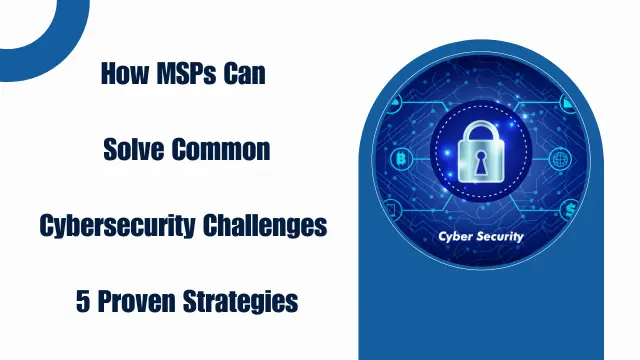
Managed Service Providers (MSPs) are pivotal in addressing pressing cybersecurity challenges. As organizations increasingly rely on technology to drive efficiency and innovation, they face a corresponding rise in cybersecurity threats. MSPs are at the forefront, offering essential cybersecurity solutions to protect against these evolving risks. From comprehensive threat detection and response to ensuring regulatory compliance, MSPs employ proven strategies to safeguard sensitive data and maintain operational continuity. This article explores five key strategies MSPs can implement to mitigate cybersecurity challenges effectively, ensuring robust protection for their client’s digital assets and fostering trust in an increasingly interconnected world.
5 Proven Strategies To Solve Common Cybersecurity Challenges
MSPs can implement these 5 proven key strategies to tackle cybersecurity challenges effectively. These strategies mitigate risks and ensure comprehensive protection against evolving cyber threats.
1. Comprehensive Threat Detection and Response
Comprehensive threat detection and response are foundational in cybersecurity challenges. MSPs employ advanced tools & techniques to monitor networks continuously, detect potential threats, and swiftly respond to incidents. By leveraging AI-driven analytics and threat intelligence, MSPs can proactively identify and neutralize emerging threats before they cause significant harm. This proactive approach not only enhances security posture but also instills confidence in clients regarding their data protection strategies.
Effective cybersecurity services entail constant vigilance and rapid incident response capabilities. MSPs ensure their clients’ networks have intrusion detection systems (IDS), endpoint detection and response solutions, and security information and event management (SIEM) platforms. These technologies work in tandem to provide real time insights into suspicious activities, enabling MSPs to mitigate risks promptly and minimize potential damages.
2. Enhanced Endpoint Security Management
Endpoint security management remains a critical aspect of cybersecurity solutions provided by MSPs. With the proliferation of remote work and diverse endpoint devices, securing each endpoint against evolving threats has become increasingly complex. MSPs implement robust endpoint protection platforms (EPP) and endpoint detection and response (EDR) solutions to safeguard devices from malicious attacks.
MSPs enforce stringent endpoint security policies and regularly update software patches to address vulnerabilities promptly. Through continuous monitoring and proactive threat hunting, MSPs ensure that endpoints remain secure against sophisticated cyber threats. By adopting proactive approach to endpoint security management, MSPs can mitigate risks and bolster their clients’ overall cybersecurity posture.
3. Proactive Vulnerability Management
Proactive vulnerability management is essential for MSPs in addressing cybersecurity challenges. Vulnerability assessments and penetration testing are integral components of MSPs’ cybersecurity solutions. By identifying and prioritizing vulnerabilities within clients’ systems and applications, MSPs can mitigate potential risks before malicious actors can exploit them.
Moreover, MSPs collaborate closely with clients to develop customized vulnerability management strategies tailored to their needs and risk tolerance levels. By conducting regular security audits and implementing robust patch management processes, MSPs ensure that clients’ environments remain resilient against evolving cyber threats. Proactive vulnerability management enhances security and demonstrates MSPs’ commitment to safeguarding their clients’ sensitive information.
4. Robust Data Backup and Recovery Plans
Robust data backup and recovery plans are indispensable for MSPs’ cybersecurity. In a cyber incident or data breach, MSPs deploy comprehensive backup solutions to safeguard critical data and facilitate timely recovery. By implementing automated backup processes and conducting regular data integrity checks, MSPs ensure that clients’ data remains accessible and protected against ransomware attacks and other forms of data loss.
MSPs develop tailored disaster recovery plans (DRP) that outline predefined steps and protocols for restoring operations after a cyber incident. Through continuous testing and refinement of DRP, MSPs can minimize downtime and mitigate potential financial and reputational damages for their clients. Robust data backup and recovery plans enhance resilience & instill confidence in clients regarding their data protection strategies.
5. Compliance and Regulatory Adherence
Compliance and regulatory adherence are critical considerations for MSPs providing cybersecurity. MSPs navigate complex regulatory landscapes and industry-specific requirements to ensure clients’ adherence to legal obligations and standards. By conducting regular compliance assessments and audits, MSPs help clients mitigate regulatory risks and avoid potential penalties associated with non-compliance.

MSPs collaborate with clients to implement robust governance frameworks and data protection policies that align with relevant regulations such as PCI-DSS, HIPAA, & GDPR. By integrating compliance into their cybersecurity strategies, MSPs demonstrate their commitment to upholding the highest data privacy and security standards. Compliance and regulatory adherence mitigate legal risks and enhance trust and credibility between MSPs and their clients.
Final Words
Addressing cybersecurity challenges requires proactive measures and strategic planning, areas in which Managed IT Service Providers (MSPs) excel. MSPs provide essential layers of protection for businesses in an increasingly digital world. Contact Circle MPS today for expert cybersecurity solutions that address your business’s unique challenges and regulatory requirements. Our proven strategies and proactive approach ensure that your data remains secure and compliant, allowing you to focus on achieving your business goals.
Frequently Asked Question
What cybersecurity solutions do Managed Service Providers (MSPs) offer?
MSPs offer cybersecurity solutions, including threat detection and response, endpoint security management, vulnerability assessments, data backup and recovery, and compliance management. They tailor these services to meet their clients’ needs and risk profiles.
How do MSPs stay ahead of emerging cybersecurity threats?
MSPs stay ahead of emerging cybersecurity threats by leveraging threat intelligence feeds, monitoring industry trends, participating in cybersecurity communities, and continuously updating their cybersecurity tools and methodologies.
What should businesses consider when selecting an MSP for cybersecurity services?
When selecting an MSP for cybersecurity services, businesses should consider factors such as the MSP’s experience and expertise in cybersecurity, ability to customize solutions to meet specific business needs, track record in incident response and recovery, and commitment to compliance with industry standards.
How do MSPs monitor and respond to security incidents in real time?
MSPs utilize advanced security information and event management (SIEM) tools, intrusion detection systems (IDS), and security operations centers (SOCs) to monitor network activities and detect potential security incidents. They employ rapid incident response procedures to mitigate threats and minimize impact.
